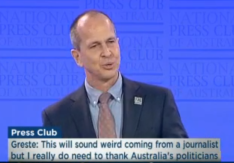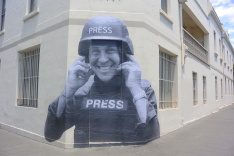Peter Greste challenges ‘parochial’ Australia over lack of international coverage
 Freed journalist Peter Greste has challenged Australian editors to ramp up their coverage of international affairs arguing too much of the local media is “parochial” and that audiences will respond positively to more global news.
Freed journalist Peter Greste has challenged Australian editors to ramp up their coverage of international affairs arguing too much of the local media is “parochial” and that audiences will respond positively to more global news.
The Al Jazeera reporter, who was jailed for more than 400 days in Egypt, also used an to the National Press Club today to challenge advocates of press freedom around the world to come together on a set of global set of principles on media freedom called the Universal Media Freedom Charter.
“This will make me quite unpopular amongst a lot of editors,” said Greste. “I am disturbed by the lack of coverage of world affairs. I don’t think we pay sufficient attention to what is going on around us.
“I know that this is largely because editors, pollsters and marketing guys have said Australians aren’t that interested in international news, that they are much more interested in what is happening in the neighbourhood than what is happening overseas.
“But I think this is one of those moments where the media as a whole needs to take a principled position and say as a nation we need to understand that if we don’t make people aware of what is going on then people won’t take an interest in it.
“We have a responsibility to place international news, foreign news, higher up than we do. I would hope that the Australian people would respond positively to that.
“Yes we do tend to be a parochial nation, we do tend to not pay quite so much attention but I think that’s a problem beyond our shores but I think that is a problem and I think Australia is poorer because of it.”
Greste and his Al Jazzeera colleagues Mohamed Fahmy and Baher Mohamed, became the faces of calls for greater press freedom during their incarceration, after being convicted of aiding the banned Muslim Brotherhood movement in the country.
On the issue of a press freedom and a Universal Media Freedom Charter, Greste acknowledged it could be controversial but argued that a charter would help the fight for press freedom across the world.
“Through my work in authoritarian places I have come to notice that there is a sliding scale in the way that power between government and media is distributed,” said Greste.
“If you take power away from one it shifts to the other. In the current environment it is all too easy and all too tempting for governments to use the War on Terror as a reason for dragging that slider to the right to claim more power in the interests of national security – trading off the media’s oversight role in the process. “”
Greste said that while in prison he and Baher Mohamed would discuss ways to protect journalists globally. “Baher and I often discussed this in our cell and Baher came up with an idea, that we began to take very very seriously indeed, what we wanted to do was to find a way to protect journalists that might transcend state boundaries,” he said.
“In the end he suggested some kind of Universal Media Freedom Charter. The kind of document that has no legal weight itself but carries a kind of moral authority just like the human rights charter. It would set a gold standard defining the relationship between government and the media, it would set out the responsibilities of each, it would set out the boundaries and the way it is supposed to work.
“It could be used as a kind of benchmark by which both of us could be measured. Crucially it would stand independently of national jurisdiction, free of the partisan domestic politics that so often scuppers these kinds of initiatives. If we get enough media groups and governments to sign on to this set of principles then it would be a tool that used to guide policy and to hold others to account.
“I know that this idea is still very much in its infancy, we are still canvasing for support and ideas, we are looking for supporters amongst media, amongst government, among human rights groups but I would like to take this opportunity to invite the media and everyone here to join the conversation, to help us with ideas and contacts so that we can draft something that has the capacity to work.”
While Greste was freed and allowed to leave Egypt at the start of the year, Canadian Mohamed Fahmy has been given bail but remains in Cairo while Baher Mohamed remains in jail.
All three still face charges with Greste telling the room: “Our trial is ongoing and so I really can’t comment any further except to say we must not let up our fight for justice.
“Until both of them and all of those convicted in absentia have been fully vindicated and are free of the charges.”
Nic Christensen



Editors and owners shouldn’t shirk their responsibilities regarding international news coverage. Peter Greste is right. (I think that young people are taking little interest in foreign affairs. They will when one day they are ordered to go to war.)
International news isn’t going to bring in the Revenue, Pete, when a Kardashian story will pull in a million impressions. It’s no longer about the quality of the news, rather the quantity of impressions.
Besides, surely they are doing a bang up job copying and pasting from Reuters to reach their 4 required daily pieces?
Most local publishers have removed sub editors in the last few years, so investing in “journos on the ground” (outside of annual sporting events) is too costly and those that want international news simply visit those that are trusted on a global scale – BBC, NYTimes, Bloomberg….
@Myriad… you’re stereotyping young Aussies there.. where are you getting your data from?
@Myriad that’s a pretty ridiculous assertion, I think young people are more engaged with world news and Australia’s interests in the world far more than previous generations. A lot of it has to do with how the news is presented. The format has to focus around world content to be engaging. For me personally, I love The Atlantic’s site Quartz as it covers world news, finance and technology exclusively in a format that is short, but links to longer form content on particular items.
@LocalPublishersareajoke – “those that want international news simply visit those that are trusted on a global scale”. Pefect summary of what I just said. BBC goes above and beyond in this area, and it’s clear Quartz are trying to grab a mix of BBC/NYT/BBW readers globally.
I think Peter and myriad need to look at what is on the news in other countries. Australia is not in the remotest parochial. Even our regional news papers have international coverage! We know more about the elections in Israel than what happens in our local gov’t let alone what is happeing in another state.
Maybe old mate Will Colvin should be promoted to Head Of International Journalism at news… shake a few things up?
Hungary has been at the centre of political tensions between US and Russia for months… for example. The US denied entry visas to several Hungarian officials. This week, Prime Minister Orban is facing calls to resign over alleged corruption. For example. Putin’s visit to Budapest a couple of weeks ago caused much interest … and so on and so on. I didn’t learn any of this from Australian media.
Greste is having a lend. The public aren’t interested in foreign cr*p. We should have less foreign news – none at all preferably.
I think that The Magus represents a pretty wide point of view.